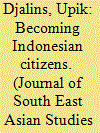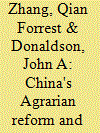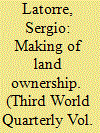|
|
|
Sort Order |
|
|
|
Items / Page
|
|
|
|
|
|
|
| Srl | Item |
| 1 |
ID:
139608


|
|
|
|
|
| Summary/Abstract |
For decades after their introduction in 1854, state-defined categories of subjects and citizens in the East Indies remained largely uncontested. But a furore erupted when Indo-Europeans — legally Europeans and citizens of the Netherlands — demanded rights to own land, rights exclusively apportioned to the autochthonous population. This article recounts a contentious campaign in the 1930s by the Indo-European Association to gain rights to own land, and the vehement rejection by Indonesians expressed in various civic outlets. I argue that by challenging state categories of entitlement, race, and belonging, the debates on rights to own land defined more sharply notions of citizenship among the Indies population. Drawing on ‘acts of citizenship’, I situate the discourse of rights at the centre of the debate on colonial citizenship. In so doing, I offer an insight into the genealogy of exclusion that has haunted the idea of citizenship in postcolonial Indonesia.
|
|
|
|
|
|
|
|
|
|
|
|
|
|
|
|
| 2 |
ID:
123963


|
|
|
|
|
| Publication |
2013.
|
| Summary/Abstract |
Many reporters and scholars outside China advocate the privatization of land ownership in China as a necessary step for the transformation of China's agriculture system into a modern, large-scale, market-oriented and technology-intensive one. Chinese scholars advocating land privatization, for their part, typically argue that land privatization would better protect farmers' rights and interests. We present a contrarian view to these calls for land privatization. Under China's current system of collective land ownership and individualized land use rights, agriculture has modernized rapidly in China in a way that has avoided privatization's many downsides. Land privatization, by contrast, would only exacerbate class inequality and social tension in rural China and further weaken farmers' positions in dealing with more powerful actors. Through analyzing six dimensions of this issue-increasing investment in land and agricultural productivity, promoting scaled-up modern agriculture, protecting farmers' land rights and preventing land grabs, enhancing rural livelihoods, and facilitating rural migrants' integration into cities-we maintain that strengthening the current system is superior to privatizing rural land.
|
|
|
|
|
|
|
|
|
|
|
|
|
|
|
|
| 3 |
ID:
164729


|
|
|
|
|
| Summary/Abstract |
Balancing urban and rural development is an important political goal in China. The failure of rural land privatization has led to a low level of rural economic development and a vast property income gap between citizens and farmers. This paper illustrates the reasons for property income inequality from the perspective of the land tenure system and the dualistic household registration system. After evaluating the segmentation of the rural land market and the rigid nature of rural land assets, a population–land coupling urbanization mechanism is proposed. The paper argues that China's land property system has externalized a high degree of geospatial and social urban and rural intertwinement. Major reform of the rural land property rights system is required to correct the situation (further development of the social security system and stable urbanization) and to increase property income potential for farmers.
|
|
|
|
|
|
|
|
|
|
|
|
|
|
|
|
| 4 |
ID:
140969


|
|
|
|
|
| Summary/Abstract |
Hernando de Soto’s best-selling book The Mystery of Capital argues that economically disadvantaged countries lack institutional arrangements that can spur economic development and capital growth. This article questions de Soto’s institutional economist account. It draws on a 14-month ethnographic study performed at two rural field sites in Colombia and in the central government office responsible for promoting land programmes designed to improve the living conditions of rural communities. This study, which focuses on the daily practices of public officials and rural campesinos, suggests the importance of the title document, and in particular the public deed, for land ownership. It describes the process by which landownership is created by the issuance of the land title document and highlights some important elements and untended consequences that are often neglected in this process of making land a legal and economic asset.
|
|
|
|
|
|
|
|
|
|
|
|
|
|
|
|
| 5 |
ID:
151575


|
|
|
|
|
| Summary/Abstract |
This case study of Gao Village has two aims: to provide an update on Gao Village since 1997, when Gao Village (Gao 1999, 2014) leaves off, and to ponder the future direction of rural China. The article begins with an update on the development of Gao Village from the late 1990s up to 2015, dealing with several major thematic topics such as demography, family and marriage, living standards, education and health care. Using empirical evidence gathered during several years of fieldwork as background, the paper then moves on to discuss the future direction of rural China. This second part covers the current intellectual and policy debate on two crucial issues: land ownership and urbanization. The paper concludes that the Chinese state is still undecided on a grand narrative: whether to travel further in the direction of full-scale capitalism or whether to retain some kind of socialist collectivism.
|
|
|
|
|
|
|
|
|
|
|
|
|
|
|
|
|
|
|
|
|